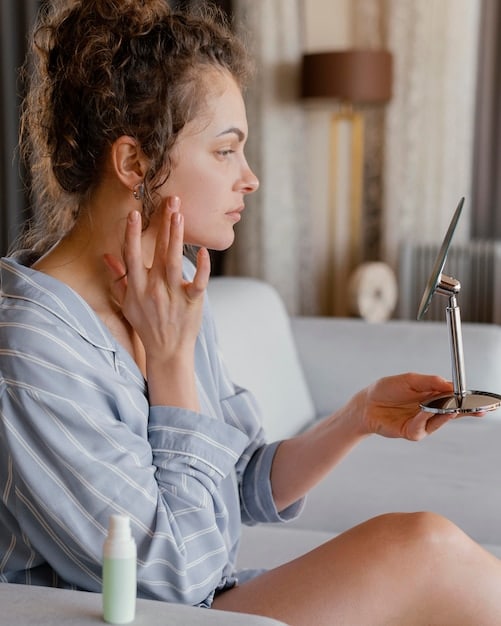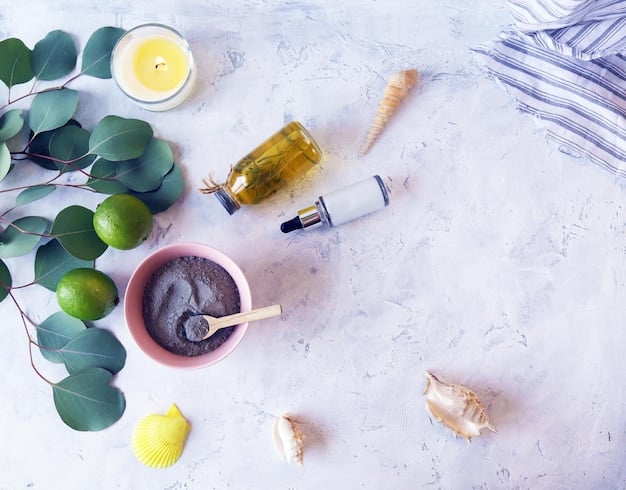Stress & Skin: Manage Stress for a Healthier Complexion

Stress significantly impacts skin health by triggering inflammatory responses and disrupting barrier function, making effective stress management crucial for maintaining a clearer, more resilient complexion and mitigating issues like acne, eczema, and premature aging.
Have you ever noticed your skin acting out when life gets overwhelming? It’s not your imagination. The intricate connection between your mind and your body is profoundly expressed through your largest organ: your skin. Understanding Stress and Your Skin: How to Manage Stress for a Healthier Complexion is not just about vanity; it’s about holistic well-being.
The Vicious Cycle: How Stress Impacts Skin Health
Our skin is a remarkable barrier, constantly defending us against environmental threats. However, it’s also a mirror reflecting our internal state, particularly when we’re under pressure. The relationship between stress and skin is a complex, bidirectional pathway involving hormones, inflammation, and cellular responses.
When the body perceives stress, whether physical or psychological, it activates the “fight or flight” response. This cascade releases a surge of hormones, most notably cortisol. While essential for short-term survival, chronic elevation of cortisol can wreak havoc on various bodily systems, including the integumentary system.
The Cortisol Connection: Inflammatory Fallout
Cortisol, often dubbed the “stress hormone,” plays a pivotal role in modulating inflammation. While it initially suppresses acute inflammatory responses, prolonged exposure to high cortisol levels can paradoxically promote chronic low-grade inflammation. This sustained inflammation is a foundational trigger for many skin ailments. It can disrupt the skin’s natural balance, weakening its protective barrier and making it more susceptible to external aggressors and internal dysregulation.
Beyond cortisol, other neuropeptides and neurotransmitters like substance P and adrenaline are also released during stress. These potent chemicals can directly influence skin cells, including keratinocytes, fibroblasts, and immune cells. This direct interaction contributes to inflammatory processes, altering cellular function and exacerbating existing skin conditions.
Disrupting the Skin Barrier and Microbiome
The skin barrier, primarily composed of lipids, acts as our first line of defense. Chronic stress can compromise this barrier function, leading to increased transepidermal water loss (TEWL) and a heightened vulnerability to irritants and allergens. A weakened barrier is less effective at maintaining hydration and protecting against pathogens, resulting in dry, sensitive, and reactive skin.
Furthermore, stress can impact the skin’s delicate microbiome, the vast community of microorganisms residing on its surface. Research suggests that psychological stress alters the diversity and composition of this microbial ecosystem, potentially favoring the growth of pathogenic bacteria. This dysbiosis can contribute to inflammatory conditions and impair the skin’s natural defense mechanisms, setting the stage for breakouts and infections.
- Increased Inflammation: Hormonal surges lead to a chronic inflammatory state.
- Weakened Barrier: Skin loses moisture and becomes more permeable to irritants.
- Microbiome Imbalance: Stress shifts skin flora, favoring problematic bacteria.
- Impaired Healing: Chronic stress slows wound healing and skin repair processes.
Understanding these underlying mechanisms is crucial for appreciating why stress manifests so visibly on our skin. It’s not just a superficial reaction; it’s a deep-seated biological response that demands a holistic approach to management.
Common Skin Conditions Exacerbated by Stress
The skin is often the first alarm bell for internal turmoil. While stress doesn’t directly ‘cause’ many skin conditions, it acts as a powerful amplifier, pushing existing predispositions into full-blown flare-ups or worsening chronic issues. Recognising these common manifestations is the first step toward effective management.
Acne Breakouts: The Stress-Hormone Connection
Acne, a condition often associated with hormonal fluctuations, finds a strong ally in stress. When stressed, the body produces more androgens (male hormones present in both sexes), which stimulate the sebaceous glands to produce excess sebum (oil). This excess oil, combined with dead skin cells and bacteria, clogs pores, leading to blackheads, whiteheads, and inflammatory pustules.
Beyond oil production, stress-induced inflammation also plays a significant role. The inflammatory cascade can worsen existing acne lesions, making them more red, painful, and persistent. The stress of dealing with acne itself can create a feedback loop, exacerbating the problem further.
Eczema and Psoriasis: Fueling Flare-Ups
For individuals predisposed to chronic inflammatory skin conditions like eczema (atopic dermatitis) and psoriasis, stress is a well-documented trigger. Both conditions involve an overactive immune response, leading to characteristic itchy, red, and scaly patches.
Stress can intensify the immune system’s reactivity, lowering the threshold for flare-ups. In eczema, stress breaks down the skin barrier, allowing allergens and irritants to penetrate more easily, leading to intense itching and inflammation. For psoriasis, stress has been shown to exacerbate the rapid turnover of skin cells, leading to thicker, more widespread plaques.

The vicious cycle here is particularly distressful: stress triggers a flare, the discomfort of the flare causes more stress, which in turn worsens the condition. Breaking this cycle requires a multi-pronged approach that addresses both the skin symptoms and the underlying stress.
Other Stress-Related Skin Issues
- Hives (Urticaria): Stress can trigger acute or chronic hives, leading to itchy, raised welts on the skin. This is often linked to the release of histamine and other inflammatory mediators.
- Rosacea: Stress is a known exacerbating factor for rosacea, causing flushing, redness, visible blood vessels, and sometimes acne-like bumps.
- Hair Loss (Telogen Effluvium): Significant psychological stress can push a large number of hair follicles into a resting phase prematurely, leading to excessive hair shedding a few months later.
- Fever Blisters/Cold Sores: For those who carry the herpes simplex virus, stress often serves as a trigger for recurrent outbreaks.
These examples underscore the undeniable link between our emotional state and our dermatological health. Recognizing these connections is the first step in creating a comprehensive strategy for healthier skin.
Effective Stress Management Techniques for Skin Health
Since stress is a significant contributor to skin woes, it naturally follows that managing stress is key to achieving a healthier complexion. This isn’t about eliminating stress entirely—an impossible feat—but rather about developing resilience and healthier coping mechanisms. Integrating effective stress management techniques into your daily routine can yield remarkable benefits for both your mind and your skin.
Mindfulness and Meditation: Calming the Nervous System
Mindfulness is the practice of being present and fully engaged in the current moment, while meditation involves training the mind to achieve a state of relaxed awareness. Both practices are incredibly powerful for reducing the physiological impacts of stress.
Regular meditation can help regulate the sympathetic nervous system (our “fight or flight” response) and promote parasympathetic activity (our “rest and digest” response). This shift reduces the release of stress hormones like cortisol, thereby lessening their inflammatory effects on the skin. Even just 10-15 minutes a day can make a difference. Many guided meditation apps are available, making it accessible for beginners.
Regular Physical Activity: Sweating Out Stress
Exercise is a potent stress reliever. Physical activity releases endorphins, natural mood elevators that can counteract the negative feelings associated with stress. It also provides a healthy outlet for pent-up energy and can improve sleep quality, which is vital for skin regeneration.
The type of exercise doesn’t matter as much as consistency. Whether it’s a brisk walk, yoga, dancing, or high-intensity interval training, find an activity you enjoy and commit to it regularly. The benefits extend beyond stress reduction, improving circulation and oxygenation to the skin, contributing to a healthy glow.
Prioritizing Sleep: The Skin’s Repair Cycle
Quality sleep is non-negotiable for skin health. During sleep, your body enters a repair and regeneration mode. Skin cells turn over, collagen production increases, and DNA repair mechanisms kick in. When sleep is disrupted or insufficient due to stress, these vital processes are compromised.
Lack of sleep elevates cortisol levels, further exacerbating skin issues. Aim for 7-9 hours of uninterrupted sleep per night. Establishing a consistent sleep schedule, creating a relaxing bedtime routine, and optimizing your sleep environment (dark, quiet, cool) can significantly improve your sleep quality and, by extension, your skin’s health.
- Deep Breathing Exercises: Simple yet powerful for immediate stress reduction.
- Nature Immersion: Spending time outdoors reduces cortisol and improves mood.
- Mindful Eating: Pay attention to your food, which can be a form of meditation.
- Social Connection: Strong social ties act as a buffer against stress.
Implementing these techniques requires consistency and patience, but the long-term benefits for both your mental well-being and your skin are well worth the effort. Consider adding professional support like therapy or counseling if stress feels unmanageable.
Skincare Strategies for Stress-Prone Skin
While managing stress internally is paramount, a well-thought-out topical skincare routine can significantly support skin health, especially when it’s under pressure. The goal is to fortify the skin barrier, soothe inflammation, and address specific stress-induced concerns without adding further irritation.
Gentle Cleansing and Hydration
Stress-prone skin often means compromised barrier function, making it more sensitive and reactive. Harsh cleansers can strip the skin of its natural oils, exacerbating dryness and irritation. Opt for a mild, pH-balanced cleanser that gently removes impurities without disrupting the skin’s protective layer.
Hydration is critical. Look for moisturizers containing ceramides, hyaluronic acid, and glycerine. These ingredients help to replenish the skin barrier, lock in moisture, and keep the skin plump and resilient. Apply moisturizer to damp skin to maximize absorption.
Targeting Inflammation with Soothing Ingredients
Given that inflammation is a cornerstone of stress-induced skin issues, incorporating calming and anti-inflammatory ingredients is beneficial. Ingredients like niacinamide (Vitamin B3), centella asiatica (Cica), colloidal oatmeal, and green tea extract can help reduce redness, soothe irritation, and support barrier repair.
These ingredients work by modulating inflammatory pathways and providing antioxidant protection, helping the skin to calm down and recover from the impacts of stress. Introducing new products one at a time can help identify any sensitivities.
Smart Product Choices: Avoid Over-Treatment
When skin acts out, the temptation might be to throw every active ingredient at it. However, stress-compromised skin often benefits from a less-is-more approach. Over-exfoliation or combining too many potent actives can further sensitize the skin and worsen inflammation.
Focus on a consistent, minimalist routine. If breakouts are a concern, consider targeted treatments with salicylic acid or benzoyl peroxide, but use them sparingly and always follow with ample hydration. For conditions like eczema or rosacea, consult with a dermatologist to tailor a routine that specifically addresses your unique needs while being mindful of potential triggers.

Remember, skincare is a supportive measure, not a cure for stress. It complements internal stress management efforts. By providing your skin with the gentle care and soothing ingredients it needs, you create an environment conducive to healing and resilience, even when life gets hectic.
Nutritional Support for Resilient Skin Under Pressure
Just as what we apply to our skin matters, what we consume plays an equally vital role in its health, particularly when combating the effects of stress. A balanced diet rich in specific nutrients can help modulate the body’s stress response, reduce inflammation, and support the skin’s natural repair mechanisms.
Antioxidant-Rich Foods: Fighting Oxidative Stress
Stress, particularly chronic stress, leads to an increase in oxidative stress within the body. This imbalance between free radicals and antioxidants can damage cells, including skin cells, leading to premature aging and compromised skin function. Consuming a rainbow of antioxidant-rich fruits and vegetables is crucial.
- Vitamin C: Found in citrus fruits, berries, bell peppers, and broccoli, Vitamin C is a powerful antioxidant, essential for collagen production and protecting skin from damage.
- Vitamin E: Abundant in nuts, seeds, spinach, and avocado, Vitamin E helps protect cell membranes from oxidative damage and supports skin barrier function.
- Beta-Carotene: Present in carrots, sweet potatoes, and leafy greens, beta-carotene converts to Vitamin A, vital for skin cell turnover and repair.
These antioxidants work synergistically to neutralize free radicals, reduce inflammation, and maintain skin integrity.
Omega-3 Fatty Acids: The Anti-Inflammatory Powerhouses
Omega-3 fatty acids are renowned for their anti-inflammatory properties, making them indispensable for stress-prone skin. They help regulate the inflammatory response, which is often heightened during periods of stress, potentially easing conditions like eczema and acne.
Excellent sources include fatty fish (salmon, mackerel, sardines), flaxseeds, chia seeds, and walnuts. Incorporating these into your diet regularly can contribute to a calmer, more resilient complexion and support overall skin barrier health.
Gut Health: The Skin-Brain Axis
The emerging science of the gut-skin axis highlights the profound connection between gut health and skin conditions. Stress can negatively impact the gut microbiome, leading to inflammation that can manifest on the skin. A healthy gut supports overall immunity and nutrient absorption.
Focus on probiotic-rich foods like yogurt, kefir, sauerkraut, and kimchi to support a balanced gut flora. Prebiotic foods (fiber-rich vegetables, fruits, whole grains) also feed beneficial gut bacteria. A thriving gut microbiome can reduce systemic inflammation, indirectly benefiting skin health and improving its ability to cope with stress.
While diet is a powerful tool, it’s part of a larger picture. No single nutrient or food group is a magic bullet, but a consistent, balanced, and nutrient-dense eating pattern can significantly bolster your skin’s resilience against the assaults of stress. Consulting with a healthcare professional or registered dietitian for personalized dietary advice can also be beneficial, especially if dealing with chronic skin issues.
When to Seek Professional Help: Dermatologist and Mental Health Support
While self-care strategies and lifestyle adjustments are incredibly powerful, there are times when the impact of stress on your skin—and your overall well-being—warrants professional intervention. Knowing when to escalate your approach is crucial for preventing long-term damage and finding effective solutions.
Consulting a Dermatologist
If your skin issues are persistent, severe, or significantly impacting your quality of life, a visit to a dermatologist is highly recommended. They can accurately diagnose your condition and provide medical treatments that go beyond over-the-counter remedies.
- Diagnosis and Treatment: A dermatologist can determine if your skin condition is indeed stress-exacerbated or if there’s another underlying cause. They can prescribe topical medications (e.g., corticosteroids for eczema, retinoids for acne), oral medications, or recommend in-office procedures.
- Personalized Skincare Plan: They can help you tailor a skincare routine that won’t irritate your already sensitive skin, recommending products specifically formulated for your condition while avoiding common irritants.
- Managing Flare-ups: For chronic conditions like psoriasis or rosacea, a dermatologist can help manage acute flare-ups and provide strategies for long-term control, often integrating medical treatments with lifestyle advice.
Don’t hesitate to seek professional dermatological advice if your skin issues are worsening, causing pain, significant discomfort, or impacting your self-esteem. Early intervention can often prevent more severe problems down the line.
Seeking Mental Health Support
Since stress is a root cause, addressing the psychological burden is equally important. If stress feels overwhelming, unmanageable, or is consistently impacting your physical health (including your skin), consider seeking support from a mental health professional.
- Therapy/Counseling: A therapist or counselor can provide tools and strategies for coping with stress, anxiety, and other emotional challenges. Techniques like Cognitive Behavioral Therapy (CBT) can help reframe negative thinking patterns and improve resilience.
- Stress Management Programs: Many therapists or clinics offer specialized programs focused on stress reduction techniques, mindfulness, and relaxation. These structured approaches can be highly effective.
- Psychiatrist Consultation: In some cases, severe stress or anxiety may benefit from medication alongside therapy, particularly if it’s leading to clinical depression or anxiety disorders. A psychiatrist can assess your needs and prescribe appropriate medication.
Remember, seeking mental health support is a sign of strength, not weakness. A holistic approach that addresses both the physical manifestations on your skin and the underlying emotional stress is the most effective path to lasting well-being and a healthier complexion.
Holistic Approach to a Radiant, Stress-Resistant Complexion
Achieving a healthy, radiant complexion isn’t merely about the products you use or the treatments you undergo; it’s a profound reflection of your overall health and well-being. When it comes to the intricate relationship between stress and your skin, a truly effective strategy demands a holistic approach.
This means understanding that your skin is not an isolated entity but an integral part of a complex system, intricately connected to your nervous, endocrine, and immune systems. Every aspect of your life—from your dietary choices to your sleep patterns, from your emotional resilience to your daily stress management—plays a role in its appearance and health.
Embracing Lifestyle as Skincare
Think of your lifestyle choices as foundational skincare. Regular physical activity, adequate and restorative sleep, and a nutrient-dense diet are not just general health recommendations; they are potent dermatological interventions. By reducing systemic inflammation, balancing hormones, and fostering cellular repair from within, these practices build skin resilience at its core.
Mindfulness and meditation, too, are powerful tools. They aren’t just for mental calm; they actively quell the physiological storm of stress, reducing the cascade of hormones and inflammatory mediators that can disrupt skin harmony. Turning off your device and truly savouring a moment of quiet can be as beneficial as any expensive serum.
The Power of Consistency and Patience
Just as stress doesn’t appear overnight, neither does its resolution. Developing a stress-resistant complexion requires consistency and patience. Small, regular actions cumulative into significant benefits over time. A balanced skincare routine, paired with consistent stress-reducing practices, will yield far greater results than sporadic, intense efforts.
There will be days when stress is unavoidable, and your skin might show it. The key is not to strive for perfection but for progress. View each challenge as an opportunity to refine your coping mechanisms and deepen your understanding of your body’s signals.
Listening to Your Skin: A Dialogue, Not a Monologue
Your skin communicates with you constantly. Learn to listen to its signals. Redness, breakouts, dryness, or increased sensitivity are often cues from your body, urging you to pay attention to your stress levels. This dialogue allows you to respond proactively, adjusting your self-care practices before minor issues escalate.
Ultimately, navigating the relationship between stress and your skin is a journey of self-discovery and self-care. By integrating mindful stress management with thoughtful skincare and nutritional choices, you empower yourself to achieve not just a healthier complexion, but a more balanced and resilient self. It’s an investment in your well-being that truly radiates from the inside out, offering not just superficial beauty, but deeper, lasting health.
| Key Point | Brief Description |
|---|---|
| 🧘♀️ Stress Impacts Skin | Stress hormones like cortisol worsen acne, eczema, and skin sensitivity. |
| 🌿 Manage Stress Holistically | Incorporate mindfulness, exercise, and good sleep for skin benefits. |
| 🥑 Nourish from Within | A diet rich in antioxidants and omega-3s supports skin resilience. |
| 👩⚕️ Seek Professional Help | Consult dermatologists or therapists for persistent skin issues or overwhelming stress. |
Frequently Asked Questions About Stress and Skin
Stress triggers the release of cortisol and other hormones, which can stimulate sebaceous glands to produce more oil. This excess oil combines with dead skin cells and bacteria, clogging pores and leading to breakouts. Stress also exacerbates inflammation, making existing acne worse.
Yes, chronic stress can contribute to premature skin aging. Elevated cortisol levels can break down collagen and elastin, leading to wrinkles and loss of skin elasticity. It also increases oxidative stress, which further damages skin cells and accelerates the aging process over time.
For immediate skin benefits through stress reduction, focus on deep breathing exercises, short mindfulness meditations, and gentle physical activity like walking. These can quickly lower cortisol levels and improve circulation, offering a swift calming effect on both your mind and skin.
Absolutely. Foods rich in antioxidants like berries and leafy greens, and omega-3 fatty acids found in fish and flaxseed, are excellent. These nutrients combat inflammation and oxidative stress, supporting your skin’s resilience against the adverse effects of psychological pressure.
You should consult a dermatologist if your stress-related skin issues are severe, persistent, painful, or significantly impact your quality of life. They can provide an accurate diagnosis, prescribe appropriate treatments, and offer a tailored skincare regimen to manage your specific condition effectively.
Conclusion
The intricate dance between our mental state and our physical appearance is nowhere more evident than in the health of our skin. Far from being a mere aesthetic concern, the impact of stress on our complexion serves as a powerful reminder of the deep interconnectedness of our bodies and minds. By understanding the mechanisms through which stress manifests on the skin, and by actively engaging in comprehensive stress management strategies—from mindful practices to nutritional support and appropriate skincare—we empower ourselves to cultivate not just a clearer complexion, but a more resilient and balanced self. This holistic approach is the true secret to unlocking lasting skin health and well-being.





